- Home
- Barbara Samuel
Heart Of A Knight Page 9
Heart Of A Knight Read online
Page 9
"Twice?" Alice stepped back, inclining her head as she looked at Lyssa, then held up the surcoat.
"I have a sister, six years older than me."
"Older? Did she marry so well she needed no inheritance?"
Lyssa shook her head. "She has not married. She tends the queen. And it is as well—she tried to murder me when I was six, and they sent her away."
"Murder you?"
"Aye. She brought me to the river, and was going to throw me in it, but Nurse found me gone in time."
The smooth dark eyes grew troubled. "Why?"
The airy garment settled over the tunic, and Lyssa touched it. "I wished to make it like spider webs," she said, her fingers remembering the pleasure of the weaving. "'Twas a good experiment."
"You have great talent, milady. I've ne'er seen so fine a cloth."
"'Tis a joy."
"What made your sister want to murder you?"
Lyssa raised her eyes. "She is an unfortunate woman. Not ugly, but very plain. Crossed eyes and bad teeth and unhealthy skin. My parents doted on her, for she lived when so many died. But when I was born, my father was so relieved to have a daughter he could dower and marry to a high lord that he turned all his attention to me." She shrugged, feeling the same strange stab of guilt she'd carried all her days. "It was unintentional cruelty, but cruel nonetheless."
"An all-too-familiar tale." Alice turned to rustle through the girdles and jewels. Her choices surprised Lyssa. Mary would have insisted on heavily encrusted collars and jewels all through her hair and a wide girdle woven with jewels. Alice took up a thinly woven belt of cloth of gold, and a headpiece set with a single emerald, and a necklace with a priceless, simple emerald set in gold.
And they were the right choices. "You have much skill, Alice, in seeing well."
Alice raised a brow. "You must leave your hair, milady. Not a braid or a tie or a weave. Only this circlet, and all that midnight beauty around you like a cloak."
Lyssa touched her hair. "Nothing?"
Alice shook her head, stepping back with a smile. "Oh, you are as beautiful as a princess, milady. If only you saw with my eyes."
Suddenly, Lyssa remembered feeling beautiful, before her marriage, before she had learned she did not know the things men wanted, as Isobel and Tall Mary knew. She felt her hair like a cloud of darkness tumbling down her back to her knees; she was aware of her slim shoulders beneath the linen. She touched her body, running her hands over her breasts and waist and down her thighs, feeling the silk and linen below her hands. "Thank you, Alice," she said. "I had forgotten how to feel like a beautiful woman."
Alice bowed. "'Tis an honor, my sweet. Now go and be young tonight!"
Just then, the sound of a horn arose. Lyssa heard it and ran to look down upon the bailey to see a party of men and horses, with a raised standard fluttering on the breeze. A man with golden hair rode a black horse. "'Tis Isobel's husband!" she cried out. She grabbed Alice's hand. "Let's go get a look at him before darkness and candlelight hide all his flaws."
Chapter 8
Thomas heard the sound of horses long before they arrived at the gate, their low thundering hooves a disturbance in the ground beneath his feet. From stables he emerged to stand and wait, a faint kindling of unease rustling over his nerves. Horses meant nobles. There might be some who would remember him.
"Were there guests coming?" he asked Robert, who had a smear of grease over his nose from oiling the bridles and leather.
"I know not." He brightened, forgetting to be sullen in his excitement at the possibility of visitors to stir up the monotony. "I heard my sister whining all last night over a betrothal. D'you suppose it could be him?"
"Could be, lad." His unease grew, but he put a benign expression on his face as he turned to watch the gate. By now, others had heard the stir, and hurried out from the kitchen, mews, and hall to see what excitement had come to Woodell.
A horn cut the day, and in rode a great party of men and fine horses, a standard carried high in front. Thomas saw at once it was a rich group; the guards wore matched tunics over their mail, and the helmets, carried now at their waists as they rode in peace into the bailey, were steel.
At the front rode a young man with the coloring of some celestial being—hair falling in palest gold curls to his mailed shoulders, eyes a blue of summer flowers, cheeks rosy red. Thomas hid a grin. He'd reckon the youth cursed that coloring every morning he lived.
But Thomas could see beyond it, to a chin of some character, a strong jaw, and a steely light of intelligence in his eyes. He rode tall, and though youth made him slim, there was breadth to his shoulders.
The finest England offered, this youth. "Isobel should be well-pleased if this is her betrothed."
"Oh, indeed," Robert breathed.
Thomas did not halt his chuckle then. To be twelve and dazzled was a rare thing. Fondly, he took Robert's shoulder, and wiped the grease from his nose. "One day, young lord, that will be you."
Robert lifted his chin arrogantly. "Aye."
Thomas gave him a little push. "Run and take his horse, lad."
When the boy dashed away, Thomas stepped back into the shadows, where he might gather clues without being observed. Carefully, he examined the faces of the large party of men-at-arms, and the shields among the lesser knights. He saw none he recognized, and his memory for such things was good. He saw also that even the lowest among them was far, far above him in birth, and they were used to a comfortable life, with servants a-scurry, and a wealth of food, and ladies in great number. He saw them eye the best of the village maids, adorned in their best for the feast, and they measured with knowing eyes the bailey yard, with its orchards and gardens and wealth of green grass, the mews and the broad stables and the castle itself, well-kept and richly appointed.
Thomas did not belong here, and they would sense it about him, just as young Robert had done. Women cared less for such things than men.
With the dawn, he would take Alice and move on. She would object, for she had grown comfortable here, but it was dangerous to stay.
But as if the fates meant to taunt him, Lady Elizabeth appeared at the door to the hall. Excitement showed in her flushed face. She paused at the top of the steps, her hands on the rail, and called out a greeting, lifting an arm.
A swift, sharp wave of yearning struck Thomas. Her hair was loose, a tumbling mass of darkness that shone with deep gloss around her body. One tendril fell over her shoulder, curved round a breast, outlining the dip of waist and flare of hip, and brushed down to her knee. She came down the steps as lightly as a cat, clad in green. He glimpsed her small feet and neat ankles below the gown, and thought of putting his mouth against that delicate joint.
He'd kept himself aloof from his desire for her till now, telling himself she was too richly born for the likes of him. But as he stood in the shadows of the stable, thinking of the very real possibility that he might never gaze upon her face again after this night, a rebellious need rose in him. A need to touch her, to hear her breath against his neck, and feel that hair whisper over his body; a need to kiss her, deeply, till she trembled.
She strode now across the yard, her skirts kicking up before her, and he watched the gossamer surcoat slide over her hips, the fabric somehow illuminating the curve of her buttocks with glossings of faint light.
Yesterday, when she had been in his arms, he'd seen her forget that she was a fine lady and he only a common knight. There had been heat on her lips, and curious, unwilling desire in her eyes. He had wanted to taste the heat on those lips, and tease it to a greater fire, and feel her body soften against his.
Instead, she had realized what she revealed, and pushed away from him, and he'd let her go.
He narrowed his eyes, searching the faces of the party once more, carefully, to be sure he had missed nothing. One night was all he asked. One night to perhaps coax her to kiss him one time.
An annoyed cry drew his attention back to the steps to the hall. Isobel, half dr
agged by stout Nurse, who grinned happily as she hauled the girl into the yard. As ever, Isobel was precisely groomed—if a vainer soul had lived in a girl's heart, Thomas had never seen it. For once, her adornments were simple—a deep sapphire tunic with a gold surcoat trimmed in miniver, with only a golden girdle around her waist, and a simple veil over her head. Nothing could cover the abundance of that figure, however, and Thomas glanced toward the gathered men as she approached, watching in amusement as the young lord struggled to hide his delighted astonishment, and hurried forward to bow over her hand. Isobel only tolerated it, and snatched her hand back quickly. When Nurse thrust an elbow in her ribs, she curtsied low.
Thomas spied Lady Elizabeth looking over her shoulder, most likely for some sign of him. A finger of dread thrust up through his gut, but he would be missed if he delayed any longer.
He stepped from the shadows, praying with all his soul that his face caused no trigger of memory in any of the men, that none would know his secret. On the morrow, he would leave here, but he most heartily wished for this night to call his own.
* * *
Isobel ached. The feast should have been an evening of triumph; she had schemed for a week on the best way to attract the attention of Lord Thomas this night. She thought she could make him fall in love with her; it had been her most powerful gift since she was twelve: men loved her when she wished it, and often when she did not.
She did not lie to herself; the knight was clearly more interested in seeing Lady Elizabeth in his bed, dismissing Isobel as a callow girl with nothing to offer him. She'd heard the village girls gossiping about his prowess, and his lusty appetites, but he let none of those girls into his bedchamber now. His lust was focused upon one woman.
In a way, Isobel liked that fixed attention. It illustrated that he could have a faithful heart if it were engaged. She only wished to focus it upon her instead of her stepmother. A man of such virility would be wasted upon Elizabeth.
But since it was upon Elizabeth that Thomas had gazed with such favor, Isobel had studied her stepmother to see what she might learn. To her surprise, it was not difficult to see why a man might like such a woman—she laughed easily, and she was kind when she spoke, even to the lowest minion. Her figure was slim and graceful, though Isobel could not see what a man could like about the boyish bosom, she knew some men did.
Elizabeth's greatest beauty, however, was in her hair. Hair that was utterly unlike Isobel's blonde curls that halted their growth at the middle of her back no matter how often she washed it in nettles or brushed it or tugged on it.
There was nothing to be done about that. The one thing Isobel could do was imitate her stepmother's simple graciousness, and demure, ladylike attire. She would hide her insignificant hair under a veil, and wear a gown that fit her properly, and she would not be bold, only laughingly flirtatious. For days, she had planned what to wear, how to behave tonight.
Tonight, she was to have danced with him, and begun her seduction.
And now it was ruined. Instead of dancing with the dark and virile Thomas, Isobel would be forced to spend her hours in the company of this milky imitation of a man. He was no more than a boy, really, not more than a year older than herself. What would she want with a boy?
Examining him from below her lashes, Isobel saw that he was fair. She might have been pleased indeed had she not seen Lord Thomas first, but next to the dark, giant Thomas, Stephen was a slim little stick, washed plain of color.
She glowered at Elizabeth. As if they had agreed to change strategies, it was Elizabeth tonight who looked as if she knew her way around a man's pleasure. The emerald of jewel and fabric set off the light in her vivid eyes, and there was something about the way her clothing moved about her that drew the attention to her breasts and waist. And to Isobel's dismay, Elizabeth had left her hair loose. It was unseemly for a widow, but no one seemed to mind—it was too beautiful. She had every right to be vain over such hair.
And oh, Lord Thomas noticed! As the evening's festivities progressed, he left Elizabeth to the business of entertaining guests, but Isobel saw him watching her, his eyes hungry, Isobel would die to have him look that way at her—and Lyssa did not even notice.
As they feasted on the roasted stag, goose, and raisin cakes covered with precious icing, Stephen leaned close to Isobel, his eyes moist with desire so plain it annoyed her. "Will you dance, fair Isobel? Mayhap you will not find me lacking if you but give me but a moment's chance."
A swell of irritation rose in her. "And mayhap, you'll be more lacking than ever," she said sharply, and stood up, unable to bear another moment. As she hurried away, she heard Lyssa speak her name sharply. Isobel ignored her.
She took refuge in the dairy, where none would bother her, and there sunk close to the cool wall and wept bitterly. It was so unfair that the king could simply say, "Marry," and marry she would, or face the consequences.
But how could she marry Stephen when she loved Thomas? For she did not doubt that she loved him. Never had she wanted a man as she wanted this one. She ached for his attention, hung on every smile he bestowed upon her, listened for his beautiful voice in the passageways. She dreamed of kissing him until her body burned.
There must be some way to thwart Lyssa's plans for her. But what?
She peered into the darkness with narrowed eyes, as a plan revealed itself. It was not ideal, perhaps even a little evil. She faced humiliation and complete disaster at worst. But at best, she might just win the husband she wished.
Buoyed, she made her way back to her chamber, and washed her face in cool water, then changed her clothes. There were some tools no man could resist—and Isobel had made it her business to know them all.
* * *
The feast, lent grandeur by the appearance of Stephen's party, was bright with laughter and good humor, and Lyssa refused to allow the sulking of a spoiled child ruin it for her. She enjoyed it as much as any of the villagers, for it gave her a chance to celebrate her return to her home, and her reunion with people she had feared would be dead. She ate heartily of the game and motrews and honeyed cakes and young carrots, and drank as freely as any villager of the ciders and ales that flowed like water into upheld cups.
Since Isobel proved difficult, Lyssa kept Stephen de Kivelsworthy next to her. She let him entertain her with tales of court, and the doings of Edward's rather spoiled daughter Isabella, and the queen's growing plumpness. She asked after her sister Eleanor, who was well.
Seeing that Kivelsworthy only half-heartedly listened to her, one eye on the door through which Isobel had disappeared, Lyssa sighed. "You must not take to heart her actions this night, my lord. She is headstrong and proud, and she did not know I had asked for a husband for her."
Even in the light of sputtering torches set around the bailey yard, Lyssa saw the deepening of color in his cheeks. "Am I so obvious?"
"Only to me."
He turned wide blue eyes to Lyssa. "She far surpasses her reputation as a beauty. There is no lovelier maid in all of England." Then, as if horrified, he added hastily, "Aside from yourself, of course."
Lyssa laughed. "No need to flatter me, sir. I am many years past maidenhood, and well-used to the dazzlement my stepdaughter causes." She touched his arm kindly. "She is fortunate to have been matched to a young and handsome knight who will care well for her."
"Mayhap she will come to see it so." Lifting a cup of ale, he sobered. "'Tis that we must speak of—our betrothal. I have me an errand to deliver on behalf of my father to an estate well south of here. We must fly in two days. Think you it better to let the formal declaration lie till we return? Perhaps then she will have warmed to me a bit."
"Nay, I do not wish to wait. It will be a formal betrothal before you leave, and then she may warm or not as she pleases." With a faint frown, she added, "She is headstrong. You will have to tame her."
Stephen's attention was seized in such a way that Lyssa knew without turning that Isobel had reappeared. The youth lowered his cup,
his mouth agape, and before he seemed to even know, he had half-risen. In a hushed voice, he said, "I vow 'twill be worth any taming."
Lyssa turned, and narrowed her eyes. Somehow, Isobel had kept the red silk gown she was forbidden to wear, and she glowed in it like a single tongue of flame. It set alight her pale hair, which she'd left free beneath a gold-shot veil. Her plump white breasts strained against the bodice long out grown, and near spilled free.
And above it all was that face, so perfectly of the moment with the high white forehead and slim delicate nose, and the wide blue eyes that gave her such an air of innocence. It was the very play of innocent eyes and face against seductive red and lush flesh that made her so irresistible.
Seeing the effect she had on Stephen, Lyssa decided to leave the girl to her tricks; whether she meant them for Stephen or not, the youth would now kill rather than let another man possess her.
"A word, sir," Lyssa said.
He could not bear to take his eyes from Isobel for even a moment; he glanced at Lyssa, then back hungrily at Isobel, who joined a dance beneath the rushlights. "Speak quickly, my lady, I beg you."
"It is that eagerness that will cause you dismay, Stephen. She is used to the attentions of all men, and you will intrigue her only if she thinks you are not already caught."
Stephen gave her an expression of dismay. "But, lady, how will I—?"
She lifted a shoulder. "The particulars I leave to you. But if you wish to truly possess her, you will heed my advice."
The chin, so hard in that angelic face, lifted. "I will try."
Lyssa watched him depart, wondering if he would have the strength. Already there were knots of young men forming around the bright flower, as if they were bees needful of her nectar.
A hand fell, briefly, against her shoulder, then lifted. Thomas rounded her and took the place Stephen had vacated. "So long a face, my lady!" he said lightly. "Methinks you have not drunk enough wine."
"Wine cures only an hour's care," Lyssa said, but she took the cup he offered.

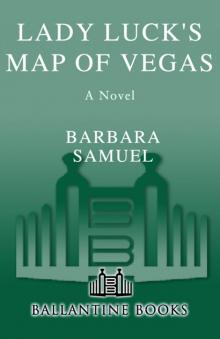 Lady Luck's Map of Vegas
Lady Luck's Map of Vegas Night of Fire
Night of Fire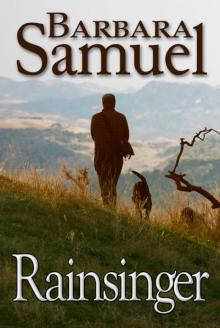 Rainsinger
Rainsinger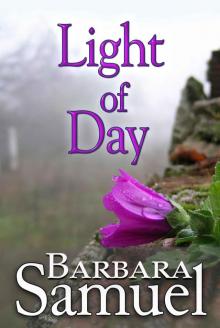 Light of Day
Light of Day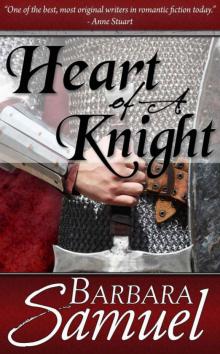 Heart Of A Knight
Heart Of A Knight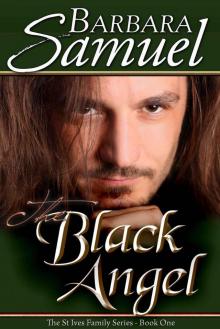 The Black Angel (The St Ives)
The Black Angel (The St Ives)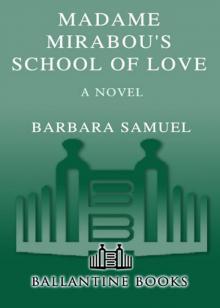 Madame Mirabou's School of Love
Madame Mirabou's School of Love